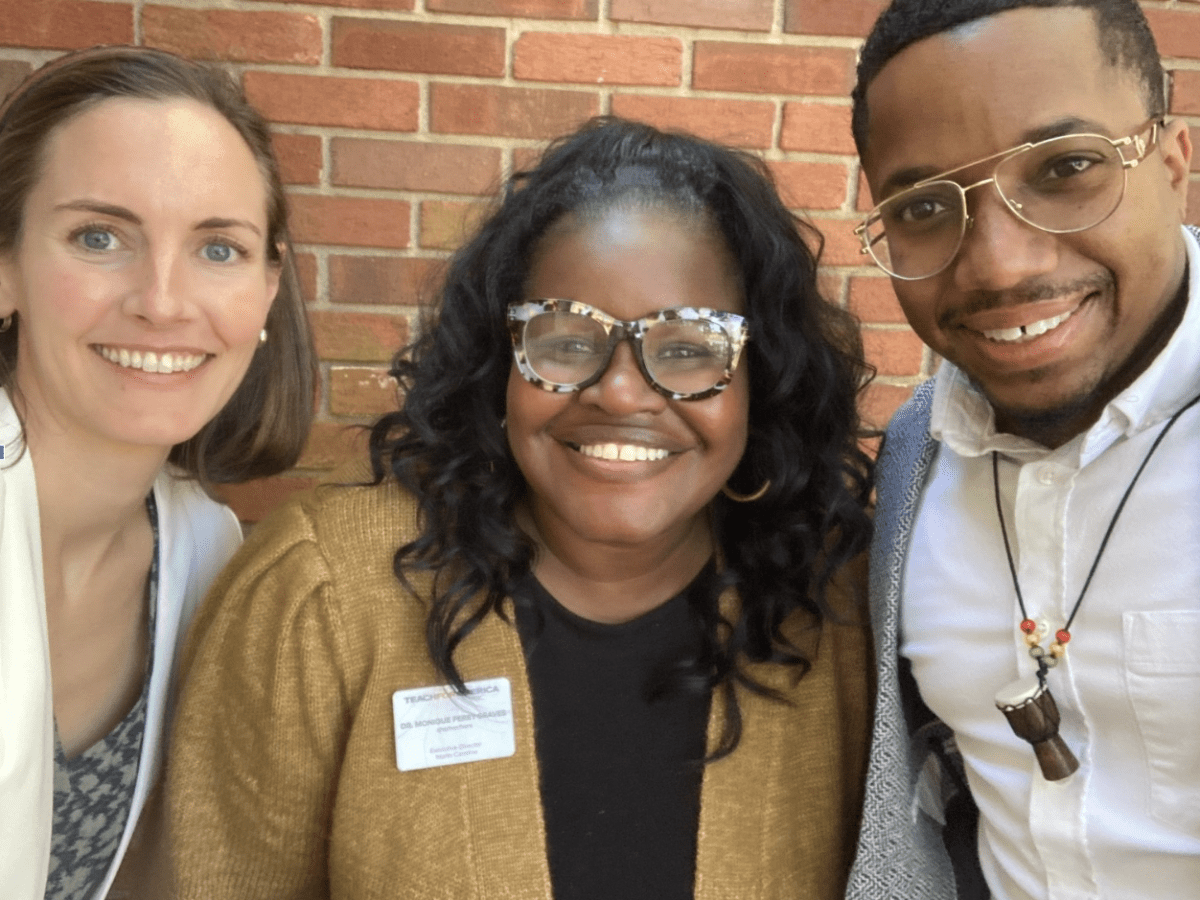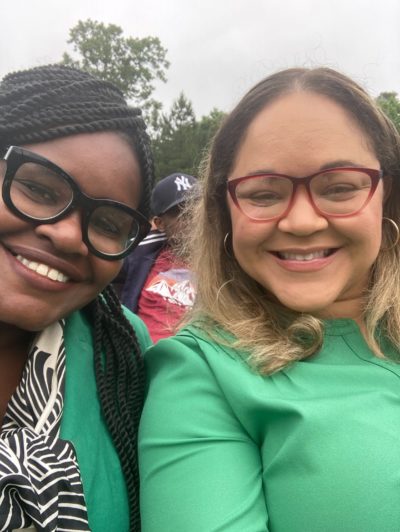

The following is part of my monthly column, One Day and One Goal: Expanding opportunity in N.C. I invite you to follow along as I share stories from classrooms and explore critical issues facing education in our state. Go here for past columns.
I stepped into the role of the first statewide executive director of Teach For America’s North Carolina regions over fourteen months ago: the exciting culmination of a professional career built in business, state government, and higher education, among other fields.
The more time I spend in this position, the more I’ve come to rely on the tools I’ve collected over my multi-industry experience, the more firmly I believe that the systemic issue of educational inequity requires a multi-industry solution, and the more I’ve come to value Teach For America’s model of impact.
Our students don’t have time to wait for us to consider solutions to educational inequity with metaphorical blinders on our eyes. That’s why we should continue to reach across lines of differences — including industry — to consider how we can leverage the network of great minds in North Carolina. Based on my experience, and on the conversations I’ve had with other social impact leaders across our state, I believe it’s possible to focus our collective impact and better the future of our education system and, as a result, our state.
Putting faces to the numbers
North Carolina contains the second-largest rural population of K-12 students in the country at 36%. I myself was once one of those numbers, coming from a rural community in eastern North Carolina before spending the majority of my primary education in the Triangle.
So, when I set out to engage in a listening tour with 100 stakeholders across the state as a key pillar of my “orientation” to a statewide role, it was with the intention of deepening the connections I already knew existed across the unique and diverse communities that comprise this state. One of the resounding themes I discovered should be a surprise to no one: parents raising children in rural counties want them to have an excellent education, just like every other parent.
In addition to parents, I spoke to teachers, teacher coaches, school leaders, elected representatives, and other community leaders. I also spoke to students — including students attending school in some of the most under-resourced districts in the state — all the while thinking of the data that paints such a limiting picture of their potential.
The status quo says that our students will only reach 45% proficiency in third grade reading benchmarks, and 53% in fifth grade math. Only 88% of them will graduate, and only 18% of those graduating will test at college readiness level.
Of all the adults rural students might encounter, 58% of them have earned a high school diploma, and 14% hold a bachelor’s degree: over 10% fewer than adults in urban counties. In a state that requires 67% of its employed population to have some postsecondary education, less than half of that population meets those requirements. That skill gap will only grow if things continue at this rate.
This is not some foreign reality with symptoms contained to only rural places. This is North Carolina.
Change here won’t stop here
Over a year later, I’ve well exceeded my goal of speaking to 100 stakeholders across the state, as opportunities to meet in-person have expanded since my start at the beginning of the pandemic. As a result, I’ve seen more promising practices, generative connections, and expressions of hope than I could have anticipated.
One bright example is Henderson Collegiate, a public charter school founded in 2010 whose recent student academic growth results were literally off the charts of the North Carolina Department of Public Instruction’s school report card. Founded in 2010 by Teach For America alumni Eric and Carice Sanchez, Henderson Collegiate is a clear proof point that a minority-led school of 94% African American and Latinx students in a rural community are capable of achieving at levels far and away above what’s expected. In fact, they can outperform anyone else in the state.
When a group of people — like the staff of Henderson Collegiate, which includes 33 Teach For America alumni — come together under the banner of what’s possible rather than what’s traditional, the results are exponential.
That’s why Teach For America’s model remains a powerful tool for driving impact in the deeply entrenched, systemic inequity of American public education. Because of our organization, over 64,000 people share the common experience of teaching in low-income communities. They all remain committed to changing outcomes for students by working and leading in education as well as sectors that impact public education. In tandem, across industries and levels of influence, these leaders are chipping away at the barriers that limit students from learning and leaving their K-12 experience ready for college and career. They are rewriting the rules based on a belief in students’ limitless potential. They are the 100+ voices of my listening tour writ large.
Connecting the dots
I felt affirmed in my choice to take this seat as TFA North Carolina’s executive director when attending my first event after being hired. A few minutes into the Belk Foundation luncheon, I realized that I recognized the presenter speaking on stage. Equity-based influencer and EducationNC reporter Rupen Fofaria and I were once fellow middle schoolers at the Ligon GT Magnet School in Raleigh. There we were, two kids raised in the Triangle several decades prior, attending the same leadership forum in Charlotte.
Reuniting with Rupen would mark the first of many unexpected connections that have made this role as charmed as it is challenging. It would be the first opportunity to reach across commonalities, and in the process gain meaningful connections, champions, and counsel.
Since then, across hundreds of introductions and conversations, those connections become less surprising and more significant. I continue to feel affirmed every time I’m able to “connect the dots” and gain deeper clarity about the patterns and through-lines that make up this state at every level.
There is power in connections, be it across 100 stakeholders, 64,000 Teach For America alumni, or 10.4 million North Carolinians. As we innovate towards solutions that will dismantle educational inequity, we must do so by looking for commonalities and leveraging our differences.




